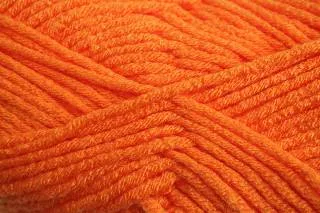Synthetic fibers are man-made fibers that are produced by chemical synthesis, in contrast to natural fibers that are derived directly from living organisms. These are the results of extensive research by scientists into the improvement of naturally occurring animal and plant fibers. Synthetic fibers are usually made by extruding the fiber-making materials through spinnerets, creating a ‘different’ fiber.
Different types of synthetic fibers are below-
Nylon fiber
Nylon fiber is one of the most widely used synthetic fibers that was produced by
Dupont as a replacement for silk. It is used in clothing or garments making,
industrial purposes, home decoration, construction industry, etc. Nylon fabric
strength is also heavy. This type of synthetic fiber is mostly used for its properties such as
abrasion resistance, flexibility, quick-drying ability, water resistance, etc.
Polyester
Polyester
was another invention of the Dupont Company. These are the most popular types of synthetic fiber
in the current world. The durability and strength of the polyester fabric, as well as its cheapness, functionality, and easy care, make it selected for most first
fashion labels.
Spandex
Spandex is a type of synthetic fiber that is a highly elastic fiber that is made of polyurethane. It can extend up to about 400%-500% of its original length, recovering and returning in the same condition. These fibers are used for flexibility like sportswear, exercise costumes, form-fitting clothes, swimwear, etc.
Acrylic fiber
Acrylic fiber is a fiber closely related to wool fiber. It is a type of synthetic fiber that is
made as an alternative to wool. Acrylic yarn can be woven into the fabric
or you can buy acrylic clothing at a fraction of the price of wool for just
warm and soft. The fur fabric that you buy as the wool fabric can be made with
acrylic. Strangers can be easily fooled by their softness and resemblance to wool
in appearance.
Olefin
Olefin
fibers are the types of synthetic fibers made from polyolefins, such as polypropylene or
polyethylene. It is not used for any garment but it is widely used in home
decoration, rope making, etc. as it is synthetic fabric but also eco-friendly
and recyclable. This is a strong, lightweight, durable fiber and is available
in many textures among others.
Neoprene
Neoprene
is a waterproof synthetic rubber as polychloroprene used in the garment
industry. This was invented by the Dupont Company in 1930 as an alternative to
natural rubber. It is latex-free, very strong, waterproof, and solvent, well,
weather, and abrasion-resistant. It is used to make bags, laptop sleeves, scuba
suits, weight suits, and sportswear.
Dyneema & Zylon
The
most powerful fiber Dyneema is made from a combination of high-end laminated
non-woven fabric composites. These types of synthetic fiber were invented by Zylon Toyobo
Corporation. These are considered to be the strongest and most textured of all
synthetic fibers.
Polyester fleece
Polyester
fleece is a double-sided pile / napped fabric made from polyester fiber.
Microfleece is also a very lightweight and soft synthetic knit fabric. It has
the same insulating capacity as wool. In fact, it is lighter in weight and
warmer than wool fabric. It was first created by Maiden Mills USA and marketed
under the trademarks of Polar Tec and Polar fleece.
Microfiber
Microfibers
are the types of synthetic textile fibers that are made from the finest yarns such as
acrylic, polyester, and nylon. The microfiber is 1/20 in diameter of silk
fiber, the best of silk natural fibers. It is used as a material for fabric
upholstery and home cleaning items such as microfiber muff.
Kevlar
If
you are looking for fabric for making bulletproof clothes, there is no better fabric
than Kevlar. It is the strongest fabric of all types of synthetic fiber fabrics. In reality,
it is 5 times stronger than steel. It had been developed in 1971 by the Dupont
Company.
Gore-Tex
Gore-Tex
fabric is considered one of the most waterproof fabrics. It is produced by W.
L. Gore & Associates, Inc. It has a special coating made of
polytetrafluoroethylene on its surface which makes it waterproof but this
fabric is breathable.
Dacron & Terelyne
Registered
trade name of Dacron Dupont polyester material. Terrylin is the first commercially marketed polyester fiber in the United States, including
Dacron. These are strong,
hypoallergenic, non-absorbent, and mildew-resistant fabrics with high
resistance to stretching which is highly resistant to degradation and chemical
bleach.
Coolmax
Coolmax
is the brand name for a series of polyester fabrics created and marketed by the
Invista Company. These fabrics feature moisture, quick drying, and comfort
that these garments bring. This fabric is used to keep wearers cool and dry to
help them optimize their performance at different levels.
Nomex
Nomex
is a heat-proof fabric used to make clothing for firefighters, astronauts,
racing car drivers, and those in the petrochemical industry who are
exposed to heat and fire. The fabric has low flammability and it does not melt
like other synthetic fabrics it is an extremely tough and durable fabric.
Dry sport
Dry
Sports Fabric is an official trademark registered by In Sport for fabric used
to make sportswear, such as cycling jerseys. It is a double-face fabric blended
with nylon on one side and polyester spandex on the other. It removes moisture
and keeps the body dry and comfortable so that the skin does not become damp.
Schoeller - keprotec
A
group of tear resistance and abrasion-resistant fabrics used to make protective
clothing made of strong Kevlar fibers. This fabric was made for their ownership
of Schoeller Textil AG of Switzerland and motorcycle racing. They have other
trademarked textiles like Schoeller - stretch light, high functional fabric
like Schoeller-prestige.
Lurex
The registered name for one type of yarn is Lurex. This type of yarn is made from a
thin strip of aluminum sandwiched between two plastic films. The metallic sheen
is used to highlight fabrics made with this yarn. The best thing about the
fabric made with this yarn is that the metal sheet does not fade or get dirty.



















0 Comments